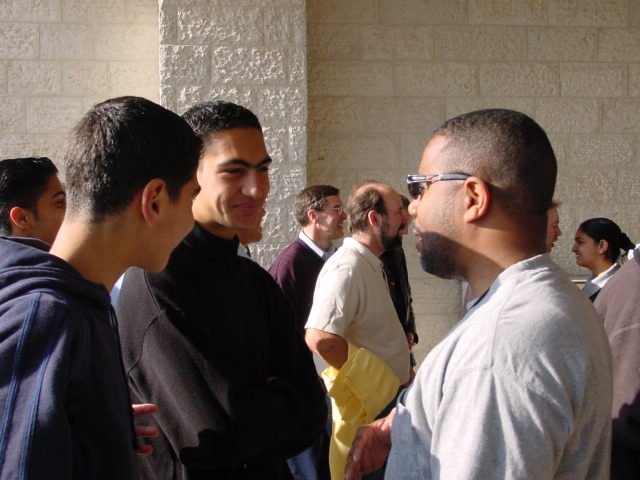The Vision of Achaia
Rev. Canon Naim Ateek leads a peace delegation attempting to enter Bethlehem.
“Macedonia and Achaia have been pleased to share their resources with the saints in Jerusalem. They owe it to them – they have come to share in their spiritual blessings, so they ought to be of service to them.” (Romans 15:25-26)
As he penned these words, the apostle Paul was preparing to visit the Church in Rome for the first time, hoping to share encouragement and fellowship with them before setting off to Spain. But before he could make this long-awaited journey, he had to return to Jerusalem, to deliver a gift to the Christians there. For as he nurtured the Gentile churches in the provinces of Achaia and Macedonia, he also took from them a collection to support the poor among the Christians in Jerusalem. He explains to the believers in Rome the importance of this offering, that Christians who have become spiritual inheritors of the Church founded in Jerusalem have a responsibility to assist that Church when in distress.
Today, as when Paul first wrote this letter, the Christians of Palestine are in distress. Like their Muslim compatriots, they are beset by great economic and political hardships, causing many to leave their homeland in search of security and freedom elsewhere. The situation is especially dire now, with immense losses - in life, in economy, and in hope.
We Western Christians are the modern-day Achaians. As those in the churches Paul planted, we have received much from our spiritual ancestors in the Holy Land. It must be our obligation, our duty, and our joy to address these desperate needs of the Church in the birthplace of Christianity. They are our mothers, our fathers, our grandmothers, and our grandfathers in our life of faith.
American Christians visiting with Palestinian youth in Zababdeh.
In the past month, we have witnessed great support flow to the Church in Palestine from fellow Western Christians. In February, three hundred Christians - mostly from the US, Canada, and Britain - gathered in Jerusalem to listen to and to stand with Christians in Palestine/Israel. We were two of the attendees; our Zababdeh address rendering us “locals” rather than internationals (although our Arabic abilities belied that). Over the course of four days, we joined together with Palestinian brothers and sisters in an effort to see life through their eyes, walk in their footsteps, and to join together in peaceful solidarity – standing as one body of Christ. The conference, organized by Sabeel (a Palestinian Christian organization), brought us to places throughout occupied Palestine, including Jerusalem, Ramallah, Bethlehem, Beit Jala, and Hebron. We waited together at checkpoints at Ramallah and Bethlehem, sharing the smallest taste of the daily frustrations of closure. We worshiped together in English, Arabic, Dutch, and Armenian. We sat at table together and broke bread. We offered what words of encouragement we could find, however insufficient they might have seemed to us. But one thing was clear: our presence brought more support than any word we could offer.
And this week, a dozen American church leaders visited Zababdeh, as part of a trip to see Palestine organized by the Christian relief and development organization World Vision. The excitement in the village was palpable, as folks awaited their arrival. Participants were paired with students, whose families would host them for one night. The anticipation was partially due to the fact that foreigners bring a sense of excitement to this otherwise rural village. But there was also a deep gratitude that the world - and American Christians in particular - knew that the faithful were still in Zababdeh. Their mere presence, the fact that they cared enough to come visit, offered great encouragement..
The support and encouragement of the Church in the land of Christ’s birth must be one that bridges our theological differences. Paul collected funds from the Gentile churches he started and nurtured. But he would deliver these funds to the Church in Jeruslaem, a Jewish church founded by his theological rival Peter. And Paul wrote fondly to the Church in Rome, a church he did not plant and in fact had never visited. He encouraged their generosity to that same church of their ancestors, the saints of Jerusalem.
As Presbyterians in Palestine, we can't help but smile at Paul. Regardless of whether we are part of the Church in Achaia or Chicago, Jerusalem or Zababdeh, we are one Church, one Body of Christ, and as such we must care for each other. And in our recent encounters with fellow Westerners, there were more denominations than we could possibly name. But all had traveled many miles to lend support to our spiritual ancestors, the followers of Christ in the land of His birth.
We greet you in Salaam-Shalom-Peace,
Marthame and Elizabeth


